By many accounts, the Wild West Music Fest was a finely tuned operation. The event, held Oct. 13-15 to celebrate the city’s 20th anniversary, ran on time, traffic issues were nil and police made no arrests.
Official attendance figures are unavailable, but city officials estimated attendance between 17,000 and 20,000 over the course of the three-day event. Despite surpassing a goal of 10,000, the city admittedly may not know if it made or lost money on the event until next year.
Apart from the operational success of the event itself, the question of whether the festival made any money remains up in the air as the city awaits a final account of the attendance figures, expenses and revenues from event producer Steve Levine Entertainment.
According to the contract between the promoter and the city, SLE has 90 business days from the end of the festival until it is obligated to provide those details, along with the accounting of the event and the details of any profits.
To the casual observer, that may sound like three months — but business days exclude weekends and holidays, which means SLE isn’t contractually obligated to supply the information until mid-February.
As final details of the festival trickle in, InMaricopa has uncovered some facts through Freedom of Information Act requests that bring some of the inner workings of the festival into focus.
The numbers
There’s no such thing as a free lunch — or birthday party for that matter. The city of Maricopa agreed to pay SLE $200,000 in the initial contract signed July 10. The first half of that money was supposed to be paid up front and the second half was to be paid within 10 days after the event.
The initial amount wasn’t enough, apparently, as about a month later, Maricopa agreed to pay SLE an additional $150,000, bringing the city’s total buy-in to $350,000. In an addendum to the original contract signed Aug. 7, the funds were to be paid upon the confirmation of the artist lineup for the festival.
The city, however, may recover some of its upfront costs. The contract stated profits were to be split 50-50 between the city and SLE. How those numbers will work out won’t be available until SLE provides the city with the final accounting statements from the event. The contract listed multiple possible revenue streams, including ticket sales, vendor fees, parking fees, sponsorships and profits from any food and beverages the promoter may sell.
SLE and the city already have a feather in their cap in that sponsorship revenues came in higher than expected at more than $88,000. The initial forecast outlined in the contract was for $75,000.
However, achieving profitability through ticket sales may prove to be an uphill battle as prices were anywhere between $5 and $300. While an average ticket was supposed to cost $30 for one day, many discounted tickets were sold for the last day, as part of the Community Day promotion. There were also early-bird discounts given as well as last-minute discounts.
The attendance goal outlined in a marketing memo shared between SLE and the city was to attract 10,000 attendees over the course of the three-day event, meaning from the outset, the city was willing to pay $35 for each person to attend the festival.
The average daily ticket went for no more than $30.
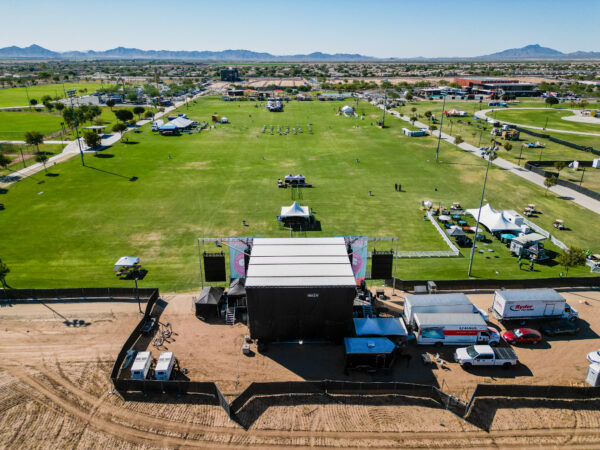
Lots of moving parts
The Wild West Music Fest featured several musical acts of national and international acclaim, a midway including nine rides and attractions along with all the games and the food you’d expect at such an event.
Vice Mayor Rich Vitiello felt it was a coming out party for the city.
“These three days were so impressive. We brought people from all over the state,” Vitiello said Nov. 7. “The staff worked day and night for weeks on end to make this happen for our city and to put us on the map.”
While the contract was signed July 10, planning for the event started months earlier, according to Quinn Konold, a spokesperson for the city.
“In early 2023, the city council tasked city staff to mark Maricopa’s 20th anniversary with a grand celebration reminiscent of Stagecoach Days,” Konold said. “The goal was first outlined during the city’s annual Futures Planning Meeting in February.”
Another challenge faced by the city and SLE might have been the relatively short period of time between the signing of the contract July 10 and the start of the event Oct. 13.
The festival was announced July 26 and the partial lineup announcement came just weeks before the event on Aug. 24.
In total, there were only 13 weeks to market the event.
With a minority population approaching 25%, Maricopa is the most diverse city in Arizona, according to data from the U.S. Census. That means there are many tastes to take into consideration for the musical acts and attractions, along with the logistics of putting on such an event.
“Organizing the festival was no small feat,” Konold said. “Securing a qualified event production partner, enticing performers to captivate Maricopa’s diverse population, and navigating regional marketing while prioritizing local engagement presented significant challenges.”
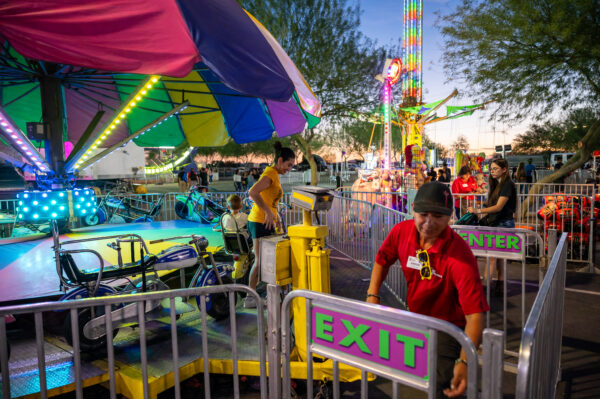
Konold pointed out other hurdles.
“With all the unknowns of a first-time event of this scale, there were questions about the community’s commitment to the event’s entrance fee and concerns about safety and cleanliness,” Konold said. “However, our investment in an experienced event producer paid off handsomely in putting these concerns to rest.”
Mayor Nancy Smith said she heard from quite a few people who didn’t attend.
“They said, ‘I just didn’t know that it was for me. After reading the comments online, I feel like I really missed out,’ and I agree. They did miss out,” Smith said.
Konold pointed out that, after the event, the premises were remarkably clean and following the close of the festival, the parking lot was empty in 11 minutes, a statement echoed by Smith and Vitiello at a November city council meeting.
Getting the word out
An important part of any party is to get invitations out to the attendees.
The first line of attack was to come through the city’s communications department, along with its communications channels, which include its social media accounts, email lists, a YouTube channel and official websites.
Mara Klein, a spokesperson for SLE, said a major focus was keeping it local.
“To appeal to residents and neighboring communities, we prioritized involving and understanding Maricopa on a deep level,” Klein said in a statement. “Intentionally forming partnerships with local businesses and concentrating our marketing efforts in Maricopa, as the event was hosted in honor of the city’s 20th anniversary, was crucial.”
However, when SLE executed its marketing plan, which included an advertising budget of more than $30,000, roughly 93% of those funds went to efforts outside of Maricopa.
The top category was social media, which accounted for $6,876.
Online (non-social media) was second at $6,518.
Another notable expenditure was on three television buys for $5,167, including 3TV AZ Family ($1,520), ABC15 ($1,647) and FOX 10 ($2,000.)
An additional $5,635 went into radio, including Audacy 101.5 ($1475), IHeart Radio ($2,660), Sierra H Broadcasting ($1,500) and $500 with Spotify.
Outdoor advertising took up $5,349 of the budget with a notable purchase at the intersection of I-10 and Chandler Boulevard between Sept. 17 and Oct. 15 for $2,660.
Direct advertising, which consisted of door hangers and flyers distributed locally, took up $2,362.
Print media outlets accounted for $750 of the budget, with all of that going to Phoenix New Times.
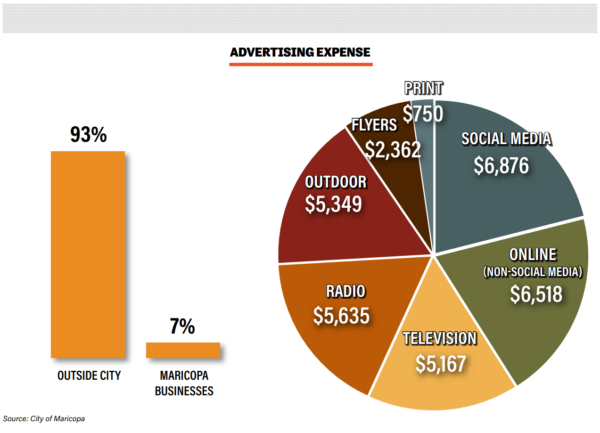
Missing details
The contract stipulated SLE to provide the city weekly progress reports that included ticket sales, marketing efforts, sponsorship and vendor reports.
A FOIA request revealed there’s no record of those contractually-agreed progress reports as the request only garnered a list of paid sponsorships and a 60-page production packet containing a boilerplate list of standard operating procedures for just about every eventuality, a list of vendors and contact information. It didn’t include any updates on ticket sales or any information that would give a greater picture into the inner workings of how the festival was produced.
In another request, the city provided an undated marketing plan with a rough accounting of the promoter’s marketing budget, along with some of the deliverables each media outlet provided or were scheduled to provide with a handful of weeks to go. Some of the wording in the report acknowledged the budget had been exhausted and referenced a final push to get the word out.
As referenced in the initial contract, the city was supposed to sign off on all contracts for musical acts. Yet none of those contracts were available through a FOIA request.
An encore?
The Wild West Music Fest was marketed this year as the first of what may become a yearly event. The website already references the 2024 Wild West Music Fest.
The city was remarkably upbeat with its answer as to whether there will be another festival next year. Konold said the event “paved the way for future spectacular celebrations.”
He said he felt the event was an over-whelming success but couldn’t answer if the city got any return on investment of taxpayers’ money. Based on the contract and conversations with city officials, it’s unclear yet what the city’s objective returns were — financial or otherwise.
“The Wild West Music Fest surpassed expectations, boasting robust security measures, efficient traffic plans, top-notch cleanliness strategies and an unwavering commitment to affordability,” he said. “While final financial reports are pending, our event partner has already expressed interest in extending the celebration into the coming years.”
The December edition of InMaricopa Magazine is in Maricopa mailboxes and available online.

![Wild West Music Fest Young MC works the crowd up at the Wild West Music Fest at Copper Sky Park. [Bryan Mordt]](https://www.inmaricopa.com/wp-content/uploads/2023/11/Wild-West-Music-Fest-081-scaled.jpg)



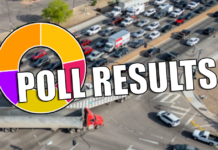

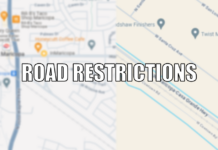

![City gave new manager big low-interest home loan City Manager Ben Bitter speaks during a Chamber of Commerce event at Global Water Resources on April 11, 2024. Bitter discussed the current state of economic development in Maricopa, as well as hinting at lowering property tax rates again. [Monica D. Spencer]](https://www.inmaricopa.com/wp-content/uploads/2024/04/spencer-041124-ben-bitter-chamber-property-taxes-web-218x150.jpg)







